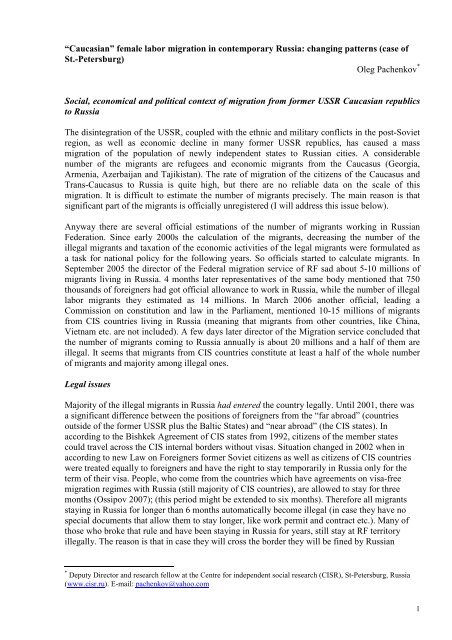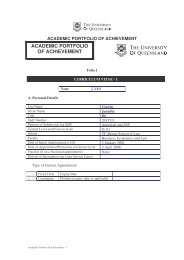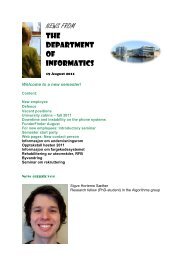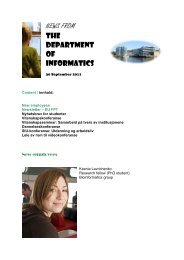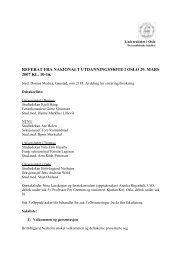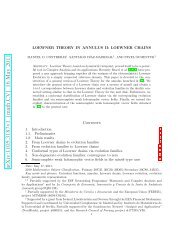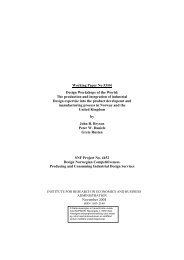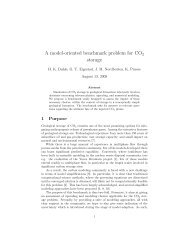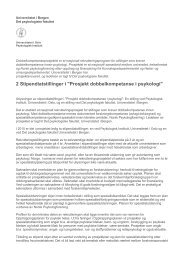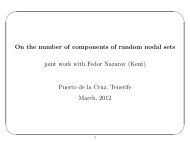?Caucasian? female labor migration in contemporary Russia ...
?Caucasian? female labor migration in contemporary Russia ...
?Caucasian? female labor migration in contemporary Russia ...
Create successful ePaper yourself
Turn your PDF publications into a flip-book with our unique Google optimized e-Paper software.
“<strong>Caucasian</strong>” <strong>female</strong> <strong>labor</strong> <strong>migration</strong> <strong>in</strong> <strong>contemporary</strong> <strong>Russia</strong>: chang<strong>in</strong>g patterns (case of<br />
St.-Petersburg)<br />
Oleg Pachenkov *<br />
Social, economical and political context of <strong>migration</strong> from former USSR <strong>Caucasian</strong> republics<br />
to <strong>Russia</strong><br />
The dis<strong>in</strong>tegration of the USSR, coupled with the ethnic and military conflicts <strong>in</strong> the post-Soviet<br />
region, as well as economic decl<strong>in</strong>e <strong>in</strong> many former USSR republics, has caused a mass<br />
<strong>migration</strong> of the population of newly <strong>in</strong>dependent states to <strong>Russia</strong>n cities. A considerable<br />
number of the migrants are refugees and economic migrants from the Caucasus (Georgia,<br />
Armenia, Azerbaijan and Tajikistan). The rate of <strong>migration</strong> of the citizens of the Caucasus and<br />
Trans-Caucasus to <strong>Russia</strong> is quite high, but there are no reliable data on the scale of this<br />
<strong>migration</strong>. It is difficult to estimate the number of migrants precisely. The ma<strong>in</strong> reason is that<br />
significant part of the migrants is officially unregistered (I will address this issue below).<br />
Anyway there are several official estimations of the number of migrants work<strong>in</strong>g <strong>in</strong> <strong>Russia</strong>n<br />
Federation. S<strong>in</strong>ce early 2000s the calculation of the migrants, decreas<strong>in</strong>g the number of the<br />
illegal migrants and taxation of the economic activities of the legal migrants were formulated as<br />
a task for national policy for the follow<strong>in</strong>g years. So officials started to calculate migrants. In<br />
September 2005 the director of the Federal <strong>migration</strong> service of RF sad about 5-10 millions of<br />
migrants liv<strong>in</strong>g <strong>in</strong> <strong>Russia</strong>. 4 months later representatives of the same body mentioned that 750<br />
thousands of foreigners had got official allowance to work <strong>in</strong> <strong>Russia</strong>, while the number of illegal<br />
<strong>labor</strong> migrants they estimated as 14 millions. In March 2006 another official, lead<strong>in</strong>g a<br />
Commission on constitution and law <strong>in</strong> the Parliament, mentioned 10-15 millions of migrants<br />
from CIS countries liv<strong>in</strong>g <strong>in</strong> <strong>Russia</strong> (mean<strong>in</strong>g that migrants from other countries, like Ch<strong>in</strong>a,<br />
Vietnam etc. are not <strong>in</strong>cluded). A few days later director of the Migration service concluded that<br />
the number of migrants com<strong>in</strong>g to <strong>Russia</strong> annually is about 20 millions and a half of them are<br />
illegal. It seems that migrants from CIS countries constitute at least a half of the whole number<br />
of migrants and majority among illegal ones.<br />
Legal issues<br />
Majority of the illegal migrants <strong>in</strong> <strong>Russia</strong> had entered the country legally. Until 2001, there was<br />
a significant difference between the positions of foreigners from the “far abroad” (countries<br />
outside of the former USSR plus the Baltic States) and “near abroad” (the CIS states). In<br />
accord<strong>in</strong>g to the Bishkek Agreement of CIS states from 1992, citizens of the member states<br />
could travel across the CIS <strong>in</strong>ternal borders without visas. Situation changed <strong>in</strong> 2002 when <strong>in</strong><br />
accord<strong>in</strong>g to new Law on Foreigners former Soviet citizens as well as citizens of CIS countries<br />
were treated equally to foreigners and have the right to stay temporarily <strong>in</strong> <strong>Russia</strong> only for the<br />
term of their visa. People, who come from the countries which have agreements on visa-free<br />
<strong>migration</strong> regimes with <strong>Russia</strong> (still majority of CIS countries), are allowed to stay for three<br />
months (Ossipov 2007); (this period might be extended to six months). Therefore all migrants<br />
stay<strong>in</strong>g <strong>in</strong> <strong>Russia</strong> for longer than 6 months automatically become illegal (<strong>in</strong> case they have no<br />
special documents that allow them to stay longer, like work permit and contract etc.). Many of<br />
those who broke that rule and have been stay<strong>in</strong>g <strong>in</strong> <strong>Russia</strong> for years, still stay at RF territory<br />
illegally. The reason is that <strong>in</strong> case they will cross the border they will be f<strong>in</strong>ed by <strong>Russia</strong>n<br />
* Deputy Director and research fellow at the Centre for <strong>in</strong>dependent social research (CISR), St-Petersburg, <strong>Russia</strong><br />
(www.cisr.ru). E-mail: pachenkov@yahoo.com<br />
1
order servants and probably will be forbidden to come back to <strong>Russia</strong> as a penalty for violation<br />
of <strong>Russia</strong>n law on foreigners 1 .<br />
In addition, legality of one’s stay <strong>in</strong> <strong>Russia</strong> is dependent on the residential registration <strong>in</strong> the<br />
place of stay<strong>in</strong>g on the territory of RF - so called “propiska”. Everybody com<strong>in</strong>g to <strong>Russia</strong> has to<br />
be registered at a place of residence with<strong>in</strong> 3 days after com<strong>in</strong>g. Residential registration is given<br />
for the time up to 6 months. The residential registration is a part of the passport system that RF<br />
<strong>in</strong>herited from USSR, where it was mandatory. Before 1991 stay<strong>in</strong>g <strong>in</strong> USSR and then <strong>Russia</strong><br />
without passport or propiska was a crime. S<strong>in</strong>ce 1992, <strong>in</strong> accord<strong>in</strong>g to the new Constitution<br />
everyone who legally stays with<strong>in</strong> the <strong>Russia</strong>n Federation has the right to move freely and<br />
choose the place of residence (article 27, part 1). However <strong>in</strong> accord<strong>in</strong>g to this new rule <strong>Russia</strong>n<br />
nationals as well as foreigners are legally obliged to register themselves by the place of their<br />
permanent residence and temporary stay. Under the RF Law of the rights to free movement (of<br />
1993), the registration though is of a notify<strong>in</strong>g character is nevertheless an obligatory procedure.<br />
In accord<strong>in</strong>g to law, absence of registration constitutes an adm<strong>in</strong>istrative codex violation and<br />
leads to f<strong>in</strong>e with no other legal consequences for a person (Ossipov 2007). In practice the<br />
procedure of gett<strong>in</strong>g registered is complex and time-consum<strong>in</strong>g; there are a number of formal<br />
and <strong>in</strong>formal restrictions on registration both by place of residence or stay, created by direct<br />
official prescriptions or by technical limitations. Some regions also adopt their own rules of<br />
registration which <strong>in</strong>troduce additional conditions, restrictions and penalties. Therefore many<br />
migrants fail to comply with all these requirements and are forced to live without registration.<br />
In reality residential registration is a precondition for exercise of the basic rights and freedoms<br />
<strong>in</strong>clud<strong>in</strong>g employment; marriage registration; participation <strong>in</strong> elections; medical care; access to<br />
higher and occasionally even secondary education; access to social security. A person without<br />
registration cannot pay taxes, register a vehicle, obta<strong>in</strong> driver’s licence, etc. For <strong>in</strong>stance,<br />
authorities of some regions <strong>in</strong>clud<strong>in</strong>g Moscow force employers not to hire people without local<br />
residence registration. Even a <strong>Russia</strong>n citizen liv<strong>in</strong>g without a registration with<strong>in</strong> a given region,<br />
<strong>in</strong> many respects f<strong>in</strong>ds him- or herself <strong>in</strong> a position of illegal immigrant, not speak<strong>in</strong>g about real<br />
migrants who are not <strong>Russia</strong>n citizens. Many scholars claim that the ma<strong>in</strong> problem with the<br />
passport system is the fact that it can serve as a mechanism of social exclusion of certa<strong>in</strong><br />
<strong>in</strong>dividuals or groups (Ossipov 2007). In practice this tool is often employed by local authorities<br />
aga<strong>in</strong>st certa<strong>in</strong> groups – such as migrants <strong>in</strong> general and aga<strong>in</strong>st some ethnic groups <strong>in</strong> particular,<br />
for example, aga<strong>in</strong>st so called “<strong>Caucasian</strong>s”.<br />
Actually migrants are subjected to two ma<strong>in</strong> sets of laws <strong>in</strong> <strong>Russia</strong>: one is passport system and<br />
another one is formed by laws and regulations on forced migrants – refugees, asylum seekers and<br />
forced resettlers. However, at the moment, social privileges at the territory of RF are closely<br />
connected with hav<strong>in</strong>g a citizenship: only citizens have access to resources and advantages<br />
provided by state <strong>in</strong> accordance to “civic contract” between state and its people. At the same<br />
time, those who are excluded from this contract (like foreigners) cannot rely on the support of<br />
this state 2 . Labor <strong>migration</strong> is not treated officially as a sort of “forced <strong>migration</strong>”. Those who, <strong>in</strong><br />
accord<strong>in</strong>g to the po<strong>in</strong>t of view of <strong>Russia</strong>n officials, were not forced to migrate, are considered as<br />
1 However, as recent experience of my friend and <strong>in</strong>formant – woman migrant from Armenia – had shown, <strong>in</strong> real<br />
life there is a chance to cross RF border (with Ukra<strong>in</strong>e, for example) even without be<strong>in</strong>g f<strong>in</strong>ed, and to come back <strong>in</strong><br />
few hours and to get a new border stamp confirm<strong>in</strong>g new entrance to the RF territory. Sometimes corruption helps,<br />
sometimes – just personal charisma or charm.<br />
2 International migrants can get some help on basis of participation of RF <strong>in</strong> <strong>in</strong>ternational conventions on human<br />
rights and <strong>in</strong>ternational legislation on humanitarian help. But be<strong>in</strong>g a county-recipient, <strong>Russia</strong> is too weak<br />
economically and too concerned about the national idea (<strong>in</strong>terpreted <strong>in</strong> ethnic terms) to implement its duties <strong>in</strong> front<br />
of <strong>in</strong>ternational community. Only people who obta<strong>in</strong> status of refugees or asylum seekers might get some support<br />
from the state, however this only happens at declaration level; <strong>in</strong> reality this support is m<strong>in</strong>imal and anyway <strong>in</strong><br />
practice <strong>Russia</strong>n state stopped grant<strong>in</strong>g refugee status s<strong>in</strong>ce the end of 1990-s.<br />
2
“economic migrants”, and the ma<strong>in</strong> task for the state is to make them legal, means controllable<br />
and taxable.<br />
Moreover, gaps <strong>in</strong> the realization of the state <strong>migration</strong> policy create chances for bureaucratic<br />
manipulation. The state policy stresses the civil component of the nation state concept; however<br />
at the level of bureaucratic practices ethnic component of nation state is heavily employed, so<br />
“<strong>Caucasian</strong>s’ face ethnic and race discrim<strong>in</strong>ation also at official level. As a result they prefer to<br />
stay <strong>in</strong> shadow s<strong>in</strong>ce there are no real benefits form be<strong>in</strong>g legal <strong>labor</strong> migrant <strong>in</strong> <strong>contemporary</strong><br />
<strong>Russia</strong> (Guerassimova, Pachenkov 2005).<br />
Due to the lack of official structures and <strong>in</strong>stitutions work<strong>in</strong>g with migrants and support<strong>in</strong>g them,<br />
on the one hand, and due to restrictive residential registration system, on the other hand,<br />
overwhelm<strong>in</strong>g majority of migrants stay unregistered <strong>in</strong> <strong>Russia</strong>, mean<strong>in</strong>g – illegal. Consequently<br />
they have no right to work, no ability to pay taxes, no access to social benefits. They live and<br />
work <strong>in</strong> a black or at the best <strong>in</strong> a grey sphere. Migrants from Caucasus region of former USSR<br />
are even <strong>in</strong> worse conditions due to ethnic hostility and racism which are widespread <strong>in</strong> <strong>Russia</strong>n<br />
society (Brednikova, Pachenkov 1999).<br />
Chang<strong>in</strong>g patterns: <strong>female</strong> <strong>migration</strong> <strong>in</strong> <strong>Russia</strong><br />
Scholars study<strong>in</strong>g <strong>migration</strong> note that although male <strong>migration</strong> was predom<strong>in</strong>ant globally for last<br />
several decades, it seems that now patterns of <strong>migration</strong> are chang<strong>in</strong>g (Carl<strong>in</strong>g 2005).<br />
Fem<strong>in</strong>ization of <strong>migration</strong> has been recognized as a tendency at the global level (Castles and<br />
Miller 1993: 67). Today, women constitute about half of <strong>in</strong>ternational migrants and <strong>in</strong> some<br />
countries <strong>female</strong> migrants actually outnumber male migrants (Boyd, 1992; Simon and Brettell,<br />
1986). So now “male <strong>migration</strong>” pattern has been replaced by “family <strong>migration</strong>” and <strong>female</strong><br />
<strong>migration</strong>. This tendency could be noted <strong>in</strong> <strong>Russia</strong> too. For example, at the territory of <strong>Russia</strong><br />
one can f<strong>in</strong>d all three types of gender composition of <strong>migration</strong>, for example, Armenians and<br />
Azerbaijanis seem to represent “family <strong>migration</strong>” patterns, and overwhelm<strong>in</strong>g majority of<br />
migrants from Moldova, Ukra<strong>in</strong>e and Byelorussia are <strong>female</strong>s (Brednikova 2003).<br />
Concern<strong>in</strong>g the family <strong>migration</strong>, scholars suggest an explanation as follows. In early 1990-s a<br />
significant proportion of adult males from former USSR left their countries <strong>in</strong> search of job<br />
opportunities. This caused the situation when women take responsibility for the traditional<br />
patterns of male authority. Women got new power but on the other hand they were disappo<strong>in</strong>ted<br />
with this situation of be<strong>in</strong>g a woman and a man at the same time (<strong>in</strong> terms of gender roles and<br />
obligations <strong>in</strong> "functional" sense). Studies of Armenian women stay<strong>in</strong>g <strong>in</strong> Armenia while their<br />
husbands had immigrated to <strong>Russia</strong> showed that women compla<strong>in</strong>ed about this situation because<br />
of suffer<strong>in</strong>g liv<strong>in</strong>g without man and because of a sort of "symbolic loss" caused by break of<br />
traditional gender relations and deviation "from the ideal of the exemplary traditional household,<br />
from the norm to which everybody is expected to aspire" (Shahnazaryan 2005). As a result those<br />
of them who did not want to be "virtual widows" - took children and followed their husbands <strong>in</strong><br />
<strong>migration</strong>. They might come even without ask<strong>in</strong>g a permit from husbands or other elder relatives<br />
from husband’s part of family (s<strong>in</strong>ce one anyway needs support from her social networks to<br />
immigrate, so here women relied on their own part of k<strong>in</strong> or friend networks). This situation<br />
leads to changes <strong>in</strong> the family relations of the migrants, it is resulted <strong>in</strong> the reconfiguration of the<br />
gender roles and gender contracts <strong>in</strong> their families, because women become relatively free and<br />
self-dependent breadw<strong>in</strong>ners, while men stay as house husbands (Brednikova 2003).<br />
In terms of employment <strong>female</strong> migrants usually occupy the same niches as their male<br />
predecessors – ma<strong>in</strong>ly retail trade. Women who come as followers of their husbands are <strong>in</strong>cluded<br />
<strong>in</strong> their husbands social networks that allow them to f<strong>in</strong>d jobs. However they often establish \<br />
enter their own “<strong>female</strong> migrants” networks and f<strong>in</strong>d job and new opportunities through them.<br />
3
Domestic work and <strong>female</strong> <strong>Caucasian</strong> migrants <strong>in</strong> <strong>Russia</strong>n cities<br />
The demand for migrant domestic care work is socially and culturally constructed. In the other<br />
words, this construction takes place at economic, social and cultural levels. As some scholars<br />
po<strong>in</strong>t out, there are ma<strong>in</strong>ly four ma<strong>in</strong> factors that affect the situation <strong>in</strong> this sector: 1) welfare<br />
policy of the state; 2) situation with employment (and probably wider, economic situation), 3)<br />
cultural stereotypes and ideologies, 4) <strong>migration</strong> policies (Gavanas, Tobio, Williams, 2007). The<br />
further description of the situation <strong>in</strong> the sphere of migrant employment <strong>in</strong> the domestic work<br />
sector <strong>in</strong> <strong>Russia</strong> proceeds from these basic factors. S<strong>in</strong>ce “<strong>migration</strong> policy” has bean already<br />
described above, I will pay attention to the first three factors.<br />
There are several factors form<strong>in</strong>g demand for domestic workers and child care workers <strong>in</strong><br />
<strong>contemporary</strong> big <strong>Russia</strong>n cities, like St.-Petersburg or Moscow.<br />
• In the soviet times child care was a public responsibility – it was guaranteed by the state<br />
and provided by the services of the state <strong>in</strong>stitutions (k<strong>in</strong>dergartens and day nursery); also<br />
workday and workweek were limited and controlled by the state so parents were basically able to<br />
take care of children themselves. Public childcare used to be a widespread tradition and a part of<br />
the “care ideology” at Soviet times. The responsibility for provision of childcare was considered<br />
to be shared between parents and the state 3 . But this is not the case any more <strong>in</strong> post-socialist<br />
times. Majority of all the soviet welfare <strong>in</strong>stitutions were destroyed, <strong>in</strong>clud<strong>in</strong>g child care ones.<br />
Preschool and school education and care still does exist and is not very expensive, however the<br />
situation <strong>in</strong> the care for children under 3 seem to be worse. There is day nursery at k<strong>in</strong>dergartens<br />
however quality of this service is usually very low, which is well known; therefore moral<br />
pressure of the “public op<strong>in</strong>ion” forces parents to avoid day nursery and to take care of children<br />
themselves or to use relatives. So the lack of the public <strong>in</strong>stitutions provid<strong>in</strong>g high quality care<br />
services for children under 3, altogether with the changes <strong>in</strong> the ideology and values (when<br />
responsibility for any sort of care became not the state but private bus<strong>in</strong>ess) leaded work<strong>in</strong>g<br />
mothers to seek private sector services (another option is k<strong>in</strong>ship solidarity which still works, but<br />
is not as strong as it used to be – see below).<br />
• Another factor is growth <strong>in</strong> quality of life, as well as grow<strong>in</strong>g upper and middle classes,<br />
especially <strong>in</strong> big cities. This means changes <strong>in</strong> attitudes and practices. Soviet ideology was<br />
egalitarian, so it denied and stigmatized colonialism, slavery and hired <strong>labor</strong> (especially by<br />
private people - only state could hire anybody). Even though egalitarian values still are partly<br />
shared by people, however the tendency is now, especially <strong>in</strong> megapolices, that so called<br />
“western” i.e. market values are replac<strong>in</strong>g the soviet ones. Therefore hired <strong>labor</strong> is becom<strong>in</strong>g a<br />
norm, and moreover - hir<strong>in</strong>g someone for domestic work is seen as a tool to signify and <strong>in</strong>crease<br />
the social status of the employee. The gender dimension deserves especial attention <strong>in</strong> this<br />
concern.<br />
o Global processes leaded changes <strong>in</strong> the attitudes and values of <strong>Russia</strong>n women,<br />
especially – those of certa<strong>in</strong> generation and class. I.e. middle class young women are<br />
gett<strong>in</strong>g career oriented, want to be <strong>in</strong>dependent and free. This freedom implies career,<br />
changes <strong>in</strong> the fem<strong>in</strong><strong>in</strong>ity patterns (shift from good mother and wife to breadw<strong>in</strong>ners and<br />
career successful professionals); and hired domestic work and waged nannies are <strong>in</strong>tegral<br />
part of these new patterns (Rotkirch, Temk<strong>in</strong>a 1997, Zdravomyslova 2006).<br />
o Social networks and especially family ties were much closer <strong>in</strong> soviet times than<br />
now; then they faced challenges of wild capitalism, free market and modernization<br />
3 It seems to be similar to Scand<strong>in</strong>avian patterns (Björnberg 2002, a,b), even though there are some significant<br />
differences, for example, shared parent<strong>in</strong>g and gender equality were not dom<strong>in</strong>ant cultural values or patterns <strong>in</strong><br />
USSR.<br />
4
processes; western way of life with its <strong>in</strong>dividualism values was adopted <strong>in</strong> post-socialist<br />
<strong>Russia</strong>. This leaded to the weaken<strong>in</strong>g of the family ties and former patterns of family<br />
relations. As a result, elder family members, like grannies and other <strong>female</strong> relatives, are<br />
not ready to take responsibility for child care of their younger relatives any more; or at least<br />
not <strong>in</strong> the same scope. It happens partly because the elders are employed (sometimes<br />
<strong>in</strong>formally, when already retired), partly because they do not feel the child care to be a<br />
value and their responsibility (this is especially characteristic for big cities). Therefore<br />
young parents, who can not rely on family care any more, are forced to resort to the help of<br />
waged domestic work and private child care workers.<br />
So there is a grow<strong>in</strong>g demand for waged domestic work and childcare <strong>in</strong> <strong>contemporary</strong> big<br />
<strong>Russia</strong>n cities. However <strong>in</strong> reality, <strong>female</strong> migrant are not represented <strong>in</strong> the sector of domestic<br />
and child care work, <strong>in</strong> spite of such a demand and <strong>in</strong> spite of the fact that this is one of the most<br />
popular economic niche for <strong>female</strong> migrants all over the world. In <strong>Russia</strong> this niche is ma<strong>in</strong>ly<br />
occupied by either young women hav<strong>in</strong>g special education who are usually hired via agencies, or<br />
by local women of middle age and elder who are found through social networks. Prelim<strong>in</strong>ary<br />
observations and analysis allow to identify several reasons, expla<strong>in</strong><strong>in</strong>g why immigrant <strong>female</strong>s<br />
are not dom<strong>in</strong>at<strong>in</strong>g <strong>in</strong> this sector and loose the competition with locals. I would like to note that,<br />
of course, all the factors listed below are <strong>in</strong>terconnected even though have different “nature” or<br />
concern different dimensions of social life <strong>in</strong> the society:<br />
1) Social reason: illegal migrants are excluded from either official <strong>labor</strong> market (agencies)<br />
and from social networks of the locals, while all the domestic workers are searched through<br />
personal networks or at official agencies – due to security issue (domestic worker is someone<br />
you allow to enter your home, your privacy; therefore you need to trust him or her; and<br />
trustworthy is checked through personal networks or is guaranteed by the reputation of the<br />
agency. This is especially important <strong>in</strong> case of child care).<br />
2) Economic reason: there is a social stratum <strong>in</strong> the society which members are <strong>in</strong> very bad<br />
economic condition even though they are not migrants: old women (also men, but men are<br />
almost never considered as domestic workers <strong>in</strong> <strong>Russia</strong>). They live for very small pensions or are<br />
unemployed because loose competition with younger colleagues, or they are partly employed for<br />
very low paid jobs (low qualification, state sector or part time). They are disadvantaged people; a<br />
sort of “migrants / refugees <strong>in</strong> their own countries”, they are excluded from prosper<strong>in</strong>g sectors of<br />
social and economic life, that can guarantee m<strong>in</strong>imal social secure. Therefore they are ready to<br />
work as domestic workers for small wages. This read<strong>in</strong>ess is completed by several cultural<br />
values, attitudes and stereotypes.<br />
3) Cultural reasons: here gender and age characteristics are of ma<strong>in</strong> importance.<br />
a. There are cultural patterns exist<strong>in</strong>g <strong>in</strong> <strong>Russia</strong>, as well as <strong>in</strong> many European countries, <strong>in</strong><br />
accord<strong>in</strong>g to which, care (especially child care) is seen as women's doma<strong>in</strong>. So preferably it is<br />
considered to be done by <strong>female</strong> relatives, mother or grannies; but <strong>in</strong> case it is impossible – by<br />
<strong>female</strong> employees. But, <strong>in</strong> fact, s<strong>in</strong>ce family ties are kept strong <strong>in</strong> <strong>Russia</strong> still, grandmothers are<br />
often <strong>in</strong>volved <strong>in</strong> domestic work and child care – for free. In this sense scholars claim that the<br />
upward social mobility of middle class young women is a built on the downward mobility of<br />
women of the elder soviet generation (Zdravomyslova 2006). Anyway this is not a pure<br />
<strong>in</strong>strumental exploitation, but a cultural pattern that elder women reproduce; they feel themselves<br />
responsible for child care, especially for grandchildren, and feel <strong>in</strong>sulted when parents hire<br />
nannies or baby-sitters <strong>in</strong>stead of us<strong>in</strong>g grandmother free <strong>labor</strong>.<br />
b. Another cultural stereotype proceed<strong>in</strong>g from the same roots is the one that domestic work<br />
and child care are to be carried out for free as “a <strong>labor</strong> of love”, so <strong>in</strong> practice this stereotype<br />
5
turns out <strong>in</strong> a low paid work, even when it is realized by non relatives - neighbors, friends or<br />
members of social network.<br />
c. One more th<strong>in</strong>g about culture that is worth attention: <strong>in</strong> Europe women from certa<strong>in</strong><br />
countries may be preferred by European employers as child care or domestic workers – <strong>in</strong><br />
comparison to the home state women. These preferences are based on ethnic or racial<br />
stereotypes envision<strong>in</strong>g certa<strong>in</strong> migrant women as more apt for care work due to the "warm<br />
family ties, strong community life and long tradition of patient maternal love of children" <strong>in</strong> their<br />
home country and culture (Hochschild 2002:23). In <strong>Russia</strong> there is no need for it: <strong>Russia</strong>n<br />
culture itself is treated as hav<strong>in</strong>g those traditions of “warm family ties” and “maternal love for<br />
children”. Nevertheless this believe has an age specifics: it is rather characteristic for elder<br />
generations, than for youngsters. Therefore elder <strong>Russia</strong>n <strong>female</strong>s fit this stereotype and are seen<br />
as the best domestic workers; “old babushkas” rem<strong>in</strong>d<strong>in</strong>g to the employers – young parents -<br />
their own parents, are therefore are seen as the best baby sitters or child care providers.<br />
4) Moral reason: employees, hir<strong>in</strong>g old <strong>Russia</strong>n babushkas feel that they help old poor<br />
women who are forced to live for their very small pensions or wages; so the notion of<br />
exploitation though might seem to be clear for Marxist oriented scholars, is not a part of the<br />
public discourse; <strong>in</strong> contrary this activity (hir<strong>in</strong>g old women as baby sitters) is estimated usually<br />
as morally positive and approved.<br />
5) Ethnic/racial reason is the last but far not least: on the on hand, many scholars stress that<br />
domestic worker is "one of the family", and I th<strong>in</strong>k that to a great extent this is a case <strong>in</strong> <strong>Russia</strong> 4 .<br />
On the other hand, due to high level of xenophobia and racism, migrants, especially<br />
“<strong>Caucasian</strong>s”, are associated <strong>in</strong> <strong>Russia</strong> - <strong>in</strong> discourses and <strong>in</strong> m<strong>in</strong>ds – with the concepts of “dirty”<br />
and <strong>in</strong>security – <strong>in</strong> all senses (Brednikova, Pachenkov 2002). They are seen as people not at the<br />
bottom of social pyramid (like poorly paid women and “babushkas”) but under or out of the<br />
social order; <strong>in</strong> some sense they are treated sometimes as a caste of “untouchable” who you only<br />
<strong>in</strong>teract with <strong>in</strong> certa<strong>in</strong> limited number of contexts (at open air market or at construction or<br />
repair<strong>in</strong>g work), and one’s own home, privacy, <strong>in</strong>timacy, child care – is def<strong>in</strong>itely not a case.<br />
Therefore <strong>Caucasian</strong> migrants have low chance to be employed as domestic workers.<br />
I th<strong>in</strong>k these listed reasons are <strong>in</strong>terest<strong>in</strong>g from the po<strong>in</strong>t of view of the discussion on domestic<br />
work. Marxist approach claims that domestic work is noth<strong>in</strong>g more than a sort of capitalist<br />
exploitation, because, like for all other types of capitalist employers “it is <strong>in</strong> the <strong>in</strong>terest of those<br />
who hire domestic workers to <strong>in</strong>crease productivity by demand<strong>in</strong>g as much <strong>labor</strong> for as low<br />
wages as possible (Romero 2002:8). This po<strong>in</strong>t of view seems to be pretty popular and<br />
dom<strong>in</strong>at<strong>in</strong>g <strong>in</strong> the discussion on domestic work. However there are alternative approaches to the<br />
domestic work, claim<strong>in</strong>g that it is more complex and complicated phenomenon. The above listed<br />
factors show the importance of non economic reasons – cultural, ethnic, moral. This leads us to<br />
treat<strong>in</strong>g domestic work as complex <strong>in</strong>terpersonal process produc<strong>in</strong>g work, class, ethnic groups<br />
etc., and view<strong>in</strong>g “…domestic workers as active subjects who are nevertheless operat<strong>in</strong>g with<strong>in</strong> a<br />
culturally and economically constituted structural <strong>in</strong>equality” (Özyeg<strong>in</strong> 2002:58).<br />
Tak<strong>in</strong>g all the above mentioned reasons <strong>in</strong>to consideration, I would say that <strong>female</strong> migrants<br />
from Byelorussia, Ukra<strong>in</strong>e and ethnic <strong>Russia</strong>ns form Moldova seem to have higher chances to be<br />
employed as domestic workers <strong>in</strong> <strong>Russia</strong> with<strong>in</strong> the next few years, s<strong>in</strong>ce they are seen as<br />
“Slavic” and therefore “our own”, “non strangers” from racist and cultural perspective (and there<br />
4 For <strong>in</strong>stance, friends told me a story about the family of their relatives, there was a woman, ethnic Armenian, who<br />
was a nanny for children for ore than ten years; she became old, children grew up, but she kept com<strong>in</strong>g as a nanny.<br />
F<strong>in</strong>ally it turned out <strong>in</strong> a comic situation: not she took care of the children (who became teenagers at that time) but<br />
all the family members helped her to dress and to shoe when she had to leave their apartment.<br />
6
are some examples of them be<strong>in</strong>g employed as domestic workers and baby sitters at <strong>Russia</strong>n<br />
middle class families already).<br />
On the other hand, very rich people (first of all – <strong>in</strong> Moscow) reproduce <strong>in</strong>ternational patterns<br />
and are hir<strong>in</strong>g Philipp<strong>in</strong>es as domestic workers and well educated English or French ladies as<br />
child care workers.<br />
Post Scriptum. The Caucasus <strong>female</strong> migrants’ perspectives <strong>in</strong> the domestic work sector<br />
However there is a niche were <strong>Caucasian</strong> <strong>female</strong> migrants also could be employed as domestic<br />
workers and waged child care providers. The demand is formed by the Diaspora people. This is<br />
especially the case for Armenians who are well known for their Diasporas exist<strong>in</strong>g all around the<br />
world. Armenians have very big Diaspora <strong>in</strong> <strong>Russia</strong> and <strong>in</strong> St.-Petersburg <strong>in</strong> particular, s<strong>in</strong>ce it is<br />
the second biggest city on the country. In accord<strong>in</strong>g to official data of the recent Census,<br />
Armenian Diaspora <strong>in</strong> St.-Petersburg consists of about 25 000 people officially registered.<br />
Moreover there are for sure some who are not will<strong>in</strong>g to be officially registered as “ethnic<br />
Armenians” <strong>in</strong> the Census or other documents, due to ethnic hostility and xenophobia which are<br />
characteristic for <strong>contemporary</strong> <strong>Russia</strong>; so the number of the members of Armenian Diaspora is<br />
even larger.<br />
There is no reliable data but <strong>in</strong> accord<strong>in</strong>g to expert estimations majority of the Armenians who<br />
immigrated to <strong>Russia</strong> many years ago and who are well <strong>in</strong>tegrated St.-Petersburg citizens now,<br />
could be attributed to the middle class. Therefore they seem to share values, needs and patterns<br />
of the way of life of <strong>contemporary</strong> St.-Petersburg middle class people; and my personal<br />
observations prove this hypothesis. These new patterns <strong>in</strong>clude weakened family ties and lack of<br />
support from family members (which is complicated by the im<strong>migration</strong> status – mean<strong>in</strong>g that<br />
part of the family stays <strong>in</strong> Armenia, especially elders who do not want to change way of life by<br />
im<strong>migration</strong> and who prefer southern climate to northern one). As a result the very pattern of<br />
hir<strong>in</strong>g waged domestic workers and child care workers are also adopted by middle class<br />
Diaspora Armenians.<br />
Above I just analyzed the factors prevent<strong>in</strong>g <strong>Russia</strong>ns from hir<strong>in</strong>g <strong>Caucasian</strong>s as domestic and<br />
child care workers; but the effect might be totally different when we th<strong>in</strong>k about chances of<br />
recent migrants from Armenia to be employed by St.-Petersburg Armenians from Diaspora:<br />
• Even though long-stand<strong>in</strong>g migrants and recent migrants often have separate networks,<br />
still these networks overlap partly (especially <strong>in</strong> case of Armenians for who Diaspora way of life<br />
is a part of culture and often – a part of a family experience). So domestic workers could be<br />
recruited by long-stand<strong>in</strong>g migrants among recent migrants through social networks; or<br />
newcomers might migrate especially to be hired as domestic worker. There are also examples<br />
when child care workers – paid and unpaid (recruited among relatives) are <strong>in</strong>vited by their<br />
relatives. There are examples when people who live <strong>in</strong> St.-Petersburg <strong>in</strong>vite friends or relatives<br />
from Armenia to St.-Petersburg to stay at their family as lives-<strong>in</strong> and to do child care and / or<br />
domestic work.<br />
• There is no place for ethnic hostility <strong>in</strong> this situation, s<strong>in</strong>ce it is obvious that members of<br />
Armenian Diaspora do not share ethnic prejudices of the local <strong>Russia</strong>ns towards their<br />
compatriots. Moreover, due to the attention paid by Armenians to ethnic solidarity issues (ma<strong>in</strong>ly<br />
due to genocide experience) they seem to be ready to make a co-ethnic person “a member of the<br />
family” (the way that domestic workers are often seen). There are still some cultural<br />
(urban/rural), regional and class boundaries and prejudices that compete with the ethnic<br />
solidarities, as our study of Azerbaijanian or Armenian Diaspora <strong>in</strong> St.-Petersburg has shown<br />
(Bredniova, Pachenkov 2003; Damberg, Chikadze 2000, Chikadze 2000, Brednikova, Chikadze<br />
7
1998). However it seems to be not such a crucial th<strong>in</strong>g for hir<strong>in</strong>g a domestic worker, because, as<br />
some scholar claim about it, employers who hire domestic workers have to conceive them “as<br />
different from themselves, yet not too different and alienat<strong>in</strong>g <strong>in</strong> an <strong>in</strong>timate family context<br />
(Moors 2003:390). It seems to be exactly the case for Armenians hir<strong>in</strong>g Armenians, while<br />
<strong>Russia</strong>ns feel <strong>Caucasian</strong>s too much “alien and different” to let them enter their privacy.<br />
• Further, Armenian culture seems to have even stronger accent on “warm family ties” and<br />
“maternal love for children” when compared to <strong>Russia</strong>n. So local patterns of child care<br />
reproduced by <strong>Russia</strong>n elder generation (especially – <strong>in</strong> megapolices like Moscow or St.-<br />
Petersburg) might seem to be examples of cruelty and abandonment towards children – form the<br />
po<strong>in</strong>t of view of Armenian traditions. Therefore local <strong>Russia</strong>n <strong>female</strong>s are not competitors for<br />
potential <strong>female</strong> Armenian child care providers – at least, not <strong>in</strong> the eyes of the parents that still<br />
share Armenian traditions of child care.<br />
• Economic factors matter here as well. Recent migrants are <strong>in</strong> very poor economic<br />
situation and are poorly paid at any economic niche where they are employed. Moreover,<br />
conditions <strong>in</strong> this sector are much batter <strong>in</strong> comparison to retail trade at open air markets where<br />
<strong>female</strong> migrants are usually employed. Therefore they are ready to work for low wages as<br />
domestic or child care workers, and <strong>in</strong> this sense they compete <strong>in</strong> the niche with <strong>Russia</strong>n<br />
babushkas.<br />
• Regard<strong>in</strong>g morality, the situation when recent Armenian migrants are employed by local<br />
Armenians from Diaspora could be attributed to the ethnic solidarity and therefore is estimated<br />
as morally positive. The notions of exploitation and slavery seem to be not mentioned even <strong>in</strong><br />
case of unpaid child care or domestic work. Because even <strong>in</strong> this case employers provide to the<br />
friends or relatives who stay at their homes as lives-<strong>in</strong> shelter, food and chance to stay <strong>in</strong> <strong>Russia</strong><br />
<strong>in</strong> much better liv<strong>in</strong>g conditions than they would have at home <strong>in</strong> Armenia (where people often<br />
live without electricity, water, gas and heat<strong>in</strong>g). Moreover, waged <strong>labor</strong> pr<strong>in</strong>ciples confront here<br />
with the strong family ties, family values and “<strong>labor</strong> for love” pr<strong>in</strong>ciples. Such complications<br />
make this situation even more <strong>in</strong>terest<strong>in</strong>g for a social scientist.<br />
Therefore it seems that the patterns of employment of the <strong>female</strong> migrants <strong>in</strong>to <strong>Russia</strong> will be<br />
chang<strong>in</strong>g. There are conditions that could stimulate the process of <strong>in</strong>volv<strong>in</strong>g <strong>female</strong> migrants <strong>in</strong>to<br />
the sector of waged domestic and child care work <strong>in</strong> <strong>Russia</strong>. There are already signs of these<br />
changes and I believe this process deserves sociological <strong>in</strong>vestigations.<br />
Literature:<br />
Björnberg, U. (2002, a) "Ideology and choice between work and care: Swedish family<br />
policy for work<strong>in</strong>g parents", Critical Social Policy Vol. 22, No. 1.<br />
Björnberg, U. (2002, b). "Work<strong>in</strong>g and car<strong>in</strong>g for children: family policies and balanc<strong>in</strong>g<br />
work and family <strong>in</strong> Sweden" <strong>in</strong> Carl<strong>in</strong>g, Alan, Duncan, S. and Edwards R. (eds.) Analyz<strong>in</strong>g<br />
Families: Morality and rationality <strong>in</strong> policy and practice. London and New York: Routledge.<br />
Boyd, M.1992 "Gender Issues <strong>in</strong> Im<strong>migration</strong> and Language Fluency". In: Im<strong>migration</strong>,<br />
Language and Ethnicity. Ed. B. Chiswick. Wash<strong>in</strong>gton D.C.: AEI Press.<br />
Brednikova O. (2003) The Female Labor Migration: A Shift <strong>in</strong> Gender Contracts?<br />
(Orig<strong>in</strong>al <strong>in</strong> <strong>Russia</strong>n: Женская трудовая миграция: смена гендерных контрактов? // Гендерные<br />
отношения в современной России: исследования 1990-х годов. Издательство Самарский университет. 2003).<br />
Brednkiova O., Pachenkov O. (2002) Migrants-"<strong>Caucasian</strong>s" <strong>in</strong> St. Petersburg: life <strong>in</strong><br />
tension. Anthropology & archeology of Eurasia [Armonk] Vol. 41. No. 2. Fall 2002. p. 43-89<br />
Brednkiova O., Pachenkov O. (1999) Economic Migrants from Azerbaidjan <strong>in</strong><br />
St.Petersburg (<strong>in</strong> co-authorship with O.Brednikova) // '<strong>Caucasian</strong> Regional Studies' Vol. 4,<br />
Number 3, 1999.<br />
8
Brednikova O., Chikadze E. (1998). Armenians of St.-Petersburg: careers of ethnicity.<br />
(Orig<strong>in</strong>al <strong>in</strong> <strong>Russia</strong>n: Ольга Бредникова, Елена Чикадзе. Армяне Санкт-Петербурга: карьеры<br />
этничности. Конструирование этничности. Этнические общины Санкт-Петербурга. Под ред. В.Воронкова,<br />
И.Освальд. СПб: «Дмитрий Буланин»: 227-259)<br />
Chikadze (2000) Armenians of St.-Petersburg – from a social movement to community<br />
<strong>in</strong>stitutions<br />
(Orig<strong>in</strong>al <strong>in</strong> <strong>Russia</strong>n: Елена Чикадзе. Армяне Петербурга – о общественного движения к общинным<br />
институтам. / Диаспоры, 2000, №1-2, М: 196-214)<br />
Damberg, Chikadze (2000) Armenians <strong>in</strong> a shoe bus<strong>in</strong>ess <strong>in</strong> St.-Petersburg. In: )//<br />
Ethnicity and Economy: collection of articles based on the materials of <strong>in</strong>ternational workshop. /<br />
Ed. by O.Brednikova, V.Voronkov., E.Chikadze. Centre for <strong>in</strong>dependent social research. Works.<br />
Vol. 8. St.Petersburg. Pp: 113-117<br />
Carl<strong>in</strong>g, J. (2005). Gender dimensions of <strong>in</strong>ternational <strong>migration</strong> /GLOBAL MIGRATION<br />
PERSPECTIVES, No. 35 May 2005, Global commission for <strong>in</strong>ternational <strong>migration</strong>,<br />
International Peace Research Institute Oslo (PRIO), Global Commission on International<br />
Migration, Geneva, Switzerland<br />
Castles, S. and Miller M. (1993) The Age of Migration: International Population<br />
Movements <strong>in</strong> the Modern World. New York: Guilford Press.<br />
Folbre N. (1986) "Clean<strong>in</strong>g House: New Perspectives on Households and Development,"<br />
Journal of Development Economics, 22:5-40.<br />
Gavanas, A., Tobio, C. , Williams, F. (2007). “Gendered Citizenship: ‘Global Care Cha<strong>in</strong>s’<br />
and Migrant Domestic Work <strong>in</strong> the UK, Spa<strong>in</strong> and Sweden,” Chapter <strong>in</strong> “Gender<strong>in</strong>g Citizenship<br />
<strong>in</strong> Western Europe: new challenges for citizenship research <strong>in</strong> a cross-national context,” edited<br />
by Ruth Lister. Policy Press (<strong>in</strong> pr<strong>in</strong>t).<br />
Guerassimova K., Pachenkov O. (2005) Needs assessment of asylum-seeker children <strong>in</strong><br />
St.-Petersburg. Hans E Andersson, Henry Ascher, Ulla Björnberg, Marita Eastmond and Lotta<br />
Mellander (Eds.). Asylum seek<strong>in</strong>g child <strong>in</strong> Europe. Centre for European Research at Göteborg<br />
University (CERGU). Gothenborg, Sweden. 2005 Pp: 183-196<br />
Hochschild, Arlie R. 2002. "Love and Gold" <strong>in</strong> Ehrenreich, Barbara and Hochschild, Arlie<br />
(eds) Global woman: Nannies, Maids, and Sex Workers <strong>in</strong> the New Economy. New York:<br />
Metropolitan Books.<br />
Light I., Bhachu P., and Karageorgis S., (1990) "Migration Networks and Immigrant<br />
Entrepreneurship" (December 31, 1989). Institute for Social Science Research. Volume V. 1989-<br />
90 - California Immigrants <strong>in</strong> World Perspective: The Conference Papers, April 1990. Paper 1.<br />
http://repositories.cdlib.org/issr/volume5/1<br />
Light I., Karageorgis S. (1994) The Ethnic Economy. // The handbook of Economic<br />
Sociology. Ed. by N. Smelser and R. Swedberg. Pr<strong>in</strong>ceton University Press.<br />
Moors A. (2003). “Migrant Domestic Workers: Debat<strong>in</strong>g Transnationalism, Identity<br />
Politics, and Family Relations. A Review Essay.” Comparative Studies <strong>in</strong> Society and History,<br />
Vol. 45, No. 2, p. 386-395.<br />
Osipov A. (2007) Fall<strong>in</strong>g between the cracks: legal status of the Meskhetian Turks <strong>in</strong> the<br />
<strong>Russia</strong>n Federation. In: Meskhetian Turks <strong>in</strong> the <strong>in</strong>tersection: <strong>in</strong>tegration, resettlement or<br />
repatriation, ECMI (<strong>in</strong> pr<strong>in</strong>t).<br />
Ossipow A. (2003) Pruefung der Identitat - Ethnische Intoleranz und Diskrim<strong>in</strong>ierung <strong>in</strong><br />
Russland // Russland auf dem Weg zum Rechtsstaat? / Berl<strong>in</strong>: Deutsches Institut fur<br />
Menschenrechte, 2003. S. 72-78.<br />
Özyeg<strong>in</strong> G. (2002) “The Doorkeeper, the Maid and the Tenant: Troubl<strong>in</strong>g Encounters <strong>in</strong><br />
the Turkish Urban Landscape.” In: Kandiyoti Deniz and Saktanber, Ayse (eds). Fragments of<br />
Culture. The Everyday of Modern Turkey. New Brunswick, New Jersey: Rutgers University<br />
Press<br />
Pachenkov O. (2004) The life of ethnic migrants: primary groups vs. imag<strong>in</strong>ed<br />
communities (based on case-study research of <strong>Caucasian</strong> migrants <strong>in</strong> St.-Petersburg, <strong>Russia</strong>). In:<br />
9
Times, places passages. Ethnological Approaches <strong>in</strong> the New Millenium. Attila Paladi-Kovacs<br />
(Ed. <strong>in</strong> chief), Gyorgyi Csukas, Rekka Kiss, and others (Eds.). Akademiai Kiado, Budapest.<br />
Portes A., Bach R. (1985) Lat<strong>in</strong> Journey: Cuban and Mexícan Immigrants <strong>in</strong> the United<br />
States. Berkeley: University of California Press.<br />
Romero, M. (2002). Maid <strong>in</strong> the U.S.A. 10 th Anniversary Edition. New York and London:<br />
Routledge.<br />
Rotkirch A., Temk<strong>in</strong>a A. (1997) "Soviet Gender Contracts and Their Shifts <strong>in</strong><br />
Contemporary <strong>Russia</strong> // Idantutkimus. 1997. N 4. Р. 6-24.<br />
Shahnazaryan N. (2005) The Virtual Widows of Migrant Husbands <strong>in</strong> War-Torn<br />
Mounta<strong>in</strong>ous Karabagh. Generations, K<strong>in</strong>ship and Care. Gendered Provisions of Social Security<br />
<strong>in</strong> Central Eastern Europe. Haukanes, Haldis og Frances P<strong>in</strong>e (Eds.). Senter for kv<strong>in</strong>ne- og<br />
kjønnsforskn<strong>in</strong>g, Universitetet i Bergen. Skriftserien Vol. nr.17<br />
Simon, R., Brettell C. (1986) Immigrant Women: An Introduction. In: International<br />
Migration: The Female Experience. Ed. R. Simon and C. Brettell. Totowa, New Jersey: Rowman<br />
and Allanheld. Pp. 3-20.<br />
Zdravomyslova (2006) New <strong>Russia</strong>n Everyday Life: Reproductive practices, gender and<br />
sexuality (Freedom / Comparative Ethnographies. Gender and Generation session at a workshop<br />
of the Uncerta<strong>in</strong>ty & Freedom Project (UFP) NECEN;<br />
http://www.necen.org/public/ufp/gender/document_view).<br />
10


